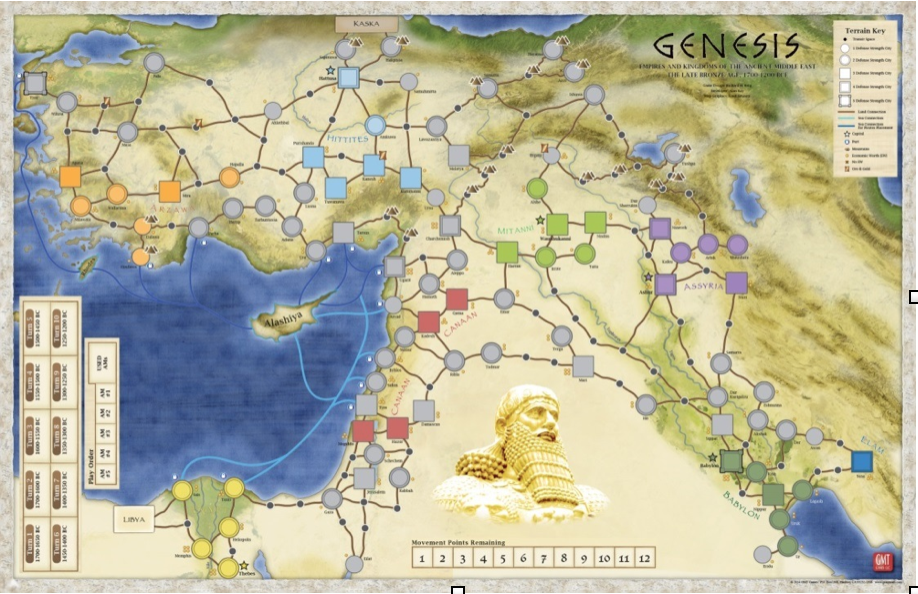 |
 |
|
Zugador’s corner > |
 |
PROVA SUL CAMPO 
Prova sul campo rappresenta “la voce” dei soci A.S.G.S. in merito a vecchie e nuove simulazioni che il mercato dei board-wargames offre. Una serie di pagine dove poter trovare piccole recensioni e/o resoconti di partite sui board-wargames che vengono giocati dal gruppo. Siamo sempre alla ricerca anche di collaboratori; se volete inviare articoli su giochi che amate e conoscete, contattate l’Amministratore.
Un interessante sito con recensioni: http://www.armchairgeneral.com/category/boardgame-reviews
Da Wikipedia:
La differenza tra guerra preistorica e guerra antica è soprattutto nell’organizzazione, e non tanto nella tecnologia. Lo sviluppo delle prime città stato, e poi degli imperi, permise un vistoso mutamento nella guerra. A partire dalla Mesopotamia, gli stati produssero un sufficiente surplus nelle risorse agricole, tale da permettere alle élite dei guerrieri a tempo pieno (ed ai relativi comandanti) di emergere. Finché il nerbo delle forzeera costituito da agricoltori, la società poteva sostenere il fatto di averli impegnati in campagne militari invece che nel lavoro ordinario per una porzione di ciascun anno. Pertanto, si svilupparono per la prima voltaeserciti organizzati.
Questi nuovi eserciti avevano un ruolo essenziale nell’evoluzione e nell’ingrandirsi degli stati, ed il primo impero, quello dei sumeri, si formò in Mesopotamia. I primi eserciti antichi continuarono ad usare soprattutto archi e lance, ovvero le armi nate nella preistoria per la caccia. In Egitto e Cina si seguì un modello simile per l’impiego in massa dellafanteria, armata nel modo anzidetto. Continua…………..

INTRODUZIONE
Dal sito della GMT Games: Genesis is a game covering the turbulent Late Bronze Age in the Middle East, where kingdoms rose and fell while establishing many of the systems and ways of life that underwrite Western Civilization. Genesisis not a simulation of events during this era. Much like its ancestor game, Pax Romana, Genesis is a game that provides the players with the historical dramatis personae and allows them to forge their own empires. It also has a great emphasis on the control of the important trade routes and commercial centers and the building of the spectacular monuments these civilizations left for posterity and wonder.Genesis can be played by from one to five gamers. Each player represents one of the major Mesopotamian Bronze Age empires: Egypt, The Hittites, The Mitanni, Assyria, Babylonia. There are several “minor” kingdoms that come into play through the use of the Event Cards: Arzawa (Apasa, Milawata, Mallarima, Mira, Hindawa, Hapalla), Canaan (Hazor, Qatna, Meggido and Kadesh), and Elam (Susa). Each is trying to expand its economic reach, allowing them to build their empire to greater levels…and this will mean coming into inimical contact with each other. Gods play a major role, as do the great caravan centers of the age,bringing in luxury items from as far away as what would be Afghanistan. And then there are the peasants and slaves which who can be most useful (some times), as well as the great techno advantages in chariotry.
SCATOLA
Bella l’immagine di copertina, che ritrae una testa di bronzo di dignitario accadico, forse Sargon.
 |
 |
MAPPA
Una tipica mappa “a punti”, cioè con luoghi e città raffigurati e collegati da linee che simboleggiano i vari terreni. A mio parere un prodotto al di sotto delle grafiche a cui ci ha abituato la GMT; bella ma non il top. La zone raffigurata corrisponde alla Turchia, Siria, Egitto e Medio Oriente. Varie tabelle e il turno di gioco completano il tabellone di gioco.
PEDINE / MATERIALI DI GIOCO
Tre i set di pedine e markers, molto colorate, belle, specie nelle figure delle varie potenze raffigurate.
TABELLE DI GIOCO
Ben sette le grandi tabelle di gioco, quindi ogni giocatore avrà un suo set di materiale da consultare! Oltre a questo, altre 5 piccole tabelle specifiche per ogni nazione, Babilonia, Assiria, Egitto, Ittiti e Mitanni.
CARTE
55 carte evento.
IMPRESSIONI DI GIOCO
Personalmente non ho ancora avuto modo di provare il gioco “dal vivo”; pubblico qualche giudizio di Nate Merchant, tratto da BGG.
I’m generally a fan of Mr. Berg’s games, and an easy sell for Bronze Age conflict, but I had several issues with the game:
1) Assyria seems to be in a tough spot right from the get-go. True, there don’t seem to be Barbarian hordes lurking nearby, as there are for the other powers, but access to cities is extremely limited. Make one mistake, roll badly in one battle, and it’s hard to see how Assyria has a chance.
Of course, knowing what I know now, I would have still advanced southwards, but I would have thrown as many military units as possible into the conflict with the Babylonians, instead of worrying about completing monuments, which don’t matter until the end of the game, anyway. But even that might not have saved my position.
2) The cards are wildly inconsistent in value. There are cards that are almost always useful, particularly the military ones, but there are others that are absolutely useless for most players most of the time. We even had a play of Traitor (take a card from another player) which was countered by that players’ Amun Ra (cancel a played card). Wake me when someone builds the Pyramids.
3) I appreciated the combat system in Pax Romana, even though it was mathy, particularly because I saw how it could model the different weapon systems and tactics used by the different powers during the rise of Rome. But I found Genesis’ combat system impenetrable and overdone. As the designer would admit, the Bronze Age armies weren’t very sophisticated at all, especially without chariots. Why, then, is there an entire four-page series of charts pertaining to battles? Why are players dealing with shifts and percentages, as if some ancient scribes were commanders? Having what is, for me, a complex battle resolution system that still can allot wild swings of luck simply seems too much for the time period, and it is an element that might keep less dedicated gamers away. Last night I was longing for the simplicity–and excitement–of Ed Beach’s HIS/VQ combat/siege system. And combat systems, ancient ones particularly, are what Mr. Berg is famous for.
4) The game feels too heavy, and thus too long, for what it is. Perhaps after one game, a second one would flow more smoothly. But this has also been my criticism of Pax Romana as well; both are quite elegant games, with some really fun events and surprises, but a bit of streamlining would really help. Also, unlike in Pax Romana, in Genesis far-flung empires have almost nothing whatsoever to do with one another. What the Egyptians, the Hittites, and the westward-expanding Mitanni did mattered little to me as Assyria in my cramped corner of the world. That is usually not true at all of the powers circling the Mediterranean in Pax Romana, where initiatives begun by neighbors are of vital importance.
5) I really don’t see why the VP track couldn’t have been included on the map edge (and there is one). It was very fiddly having to adjust the VP track with the included card, with all the VP markers atop each other.
6) Lastly, again unlike Pax Romana, there were no national distinctions, no asymmetrical kingdoms (aside from geography, obviously). That seemed to be a real lost opportunity for some chrome to differentiate the different powers.
Because I’m stubborn, and I want to make sure I give Genesis a fair shake, I will try and get another five-player gam
Links
Zugador’s Corner 
Dalla pagina social dell’amico GianLuca, commenti, impressioni e altro su boardgames. Vedi anche https://www.facebook.com/photo.php?fbid=3164832793785&set=gm.353173644702765&type=3

Brevi impressioni a caldo: ottimo gioco, quando abbiamo preparato il set up e letto il regolamento siamo stati pervasi da notevole confusione, tante sono le variabili e i possibili obiettivi per raggiungere un buon punteggio.
Una parte azionaria gestita con gli insediamenti davvero combattuta, una parte legata alla ‘cultura’ con una traccia personale in cui avanzare leggendo libri in base alle carte giocate, un’altra traccia personale in cui avanzare con i diamanti collegata alle carte e all’esplorazione, altre azioni azioni esclusive da effettuarsi sul tabellone ed un gioco continuo con le carte davvero bello che ti costringe a studiare anche gli slot in cui le andrai ad inserire.
Le strategie sono davvero innumerevoli. Per fortuna bastano pochi turni, due o tre, per chiarirsi le modalità di gioco e incominciare a divertirsi. Ci rigiocherei più che volentieri, mi ha appagato davvero molto, ma non so ancora se includerlo in collezione. Mi ha infastidito leggermente la pesca casuale dei libri, che a mio parere ti permettono di guadagnare notevoli punti se giocati con criterio, ma al tavolo non eravamo tutti della stessa idea. Inoltre il turno può essere oggetto di paralisi da analisi e il ‘cubo segna tempo’ sarebbe qui davvero consigliato.
Potrebbe essere un gioco perfetto da torneo, davvero ottimo. Se aggiungiamo che costa relativamente poco rispetto agli standard odierni è sicuramente consigliato ma richiede una categoria di giocatori più scafati, sopratutto per sorbirsi la spiegazione davvero spiazzante all’inizio.

Un discorso a parte l’ambientazione, inesistente, tutto un puro calcolo dall’inizio alla fine slegato da qualsiasi contesto.
Lo trovo un difetto ma troppo spesso me ne dimentico quando sono immerso in un gioco di tipo ‘tedesco’, sono rari gli esempi che sanno coniugare le due cose.
Bello.
LIBRO DEL MESE 
Prova sul campo rappresenta “la voce” dei soci A.S.G.S. in merito a vecchie e nuove simulazioni che il mercato dei board-wargames offre. Una serie di pagine dove poter trovare piccole recensioni e/o resoconti di partite sui board-wargames che vengono giocati dal gruppo. Siamo sempre alla ricerca anche di collaboratori; se volete inviare articoli su giochi che amate e conoscete, contattate l’Amministratore.

La rivista ARCHEo è molto apprezzata dai lettori di storia in genere; il numero di ottobre dedicato alle monografie tratta della guerra nel mondo antico, un vero piccolo manuale utilissimo per chi affronta la simulazione storica oggetto della recensione di questo mese, vedi sopra Genesis.
Gli argomenti trattati sono l’Egitto, Roma, la Grecia, i micenei, i Medi e i Persiani!
Da non perdere!

